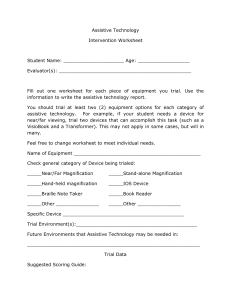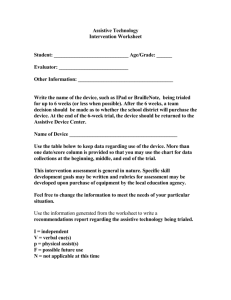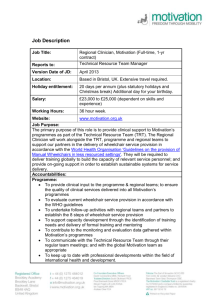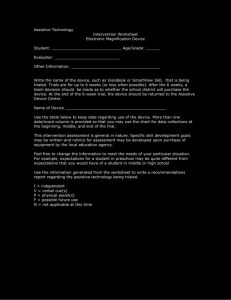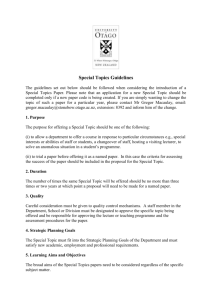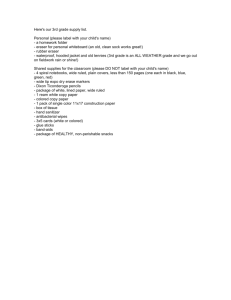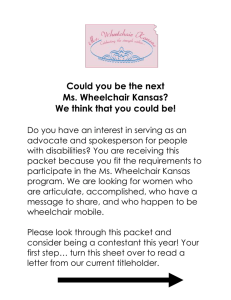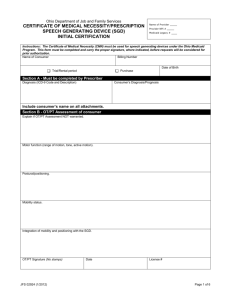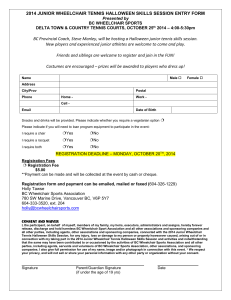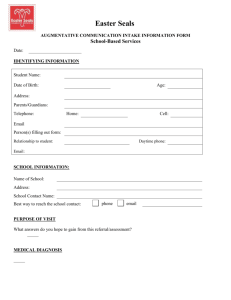Washington Speech Language Pathologist Evaluation
advertisement
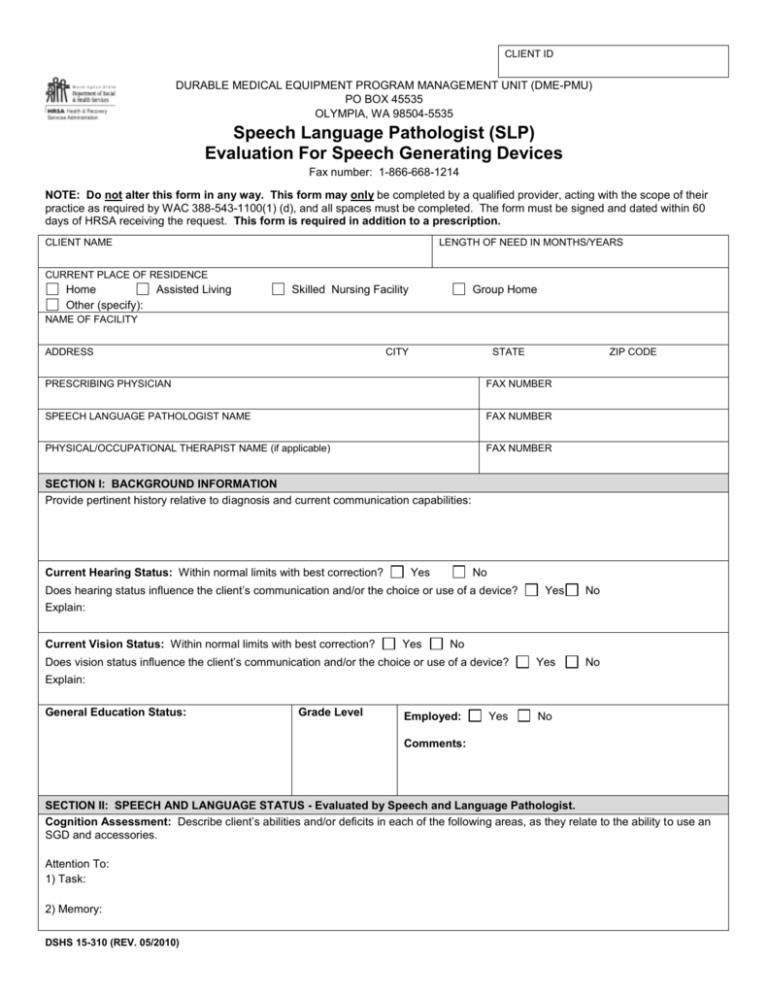
CLIENT ID DURABLE MEDICAL EQUIPMENT PROGRAM MANAGEMENT UNIT (DME-PMU) PO BOX 45535 OLYMPIA, WA 98504-5535 Speech Language Pathologist (SLP) Evaluation For Speech Generating Devices Fax number: 1-866-668-1214 NOTE: Do not alter this form in any way. This form may only be completed by a qualified provider, acting with the scope of their practice as required by WAC 388-543-1100(1) (d), and all spaces must be completed. The form must be signed and dated within 60 days of HRSA receiving the request. This form is required in addition to a prescription. CLIENT NAME LENGTH OF NEED IN MONTHS/YEARS CURRENT PLACE OF RESIDENCE Home Other (specify): Assisted Living Skilled Nursing Facility Group Home NAME OF FACILITY ADDRESS CITY STATE ZIP CODE PRESCRIBING PHYSICIAN FAX NUMBER SPEECH LANGUAGE PATHOLOGIST NAME FAX NUMBER PHYSICAL/OCCUPATIONAL THERAPIST NAME (if applicable) FAX NUMBER SECTION I: BACKGROUND INFORMATION Provide pertinent history relative to diagnosis and current communication capabilities: Current Hearing Status: Within normal limits with best correction? Yes No Does hearing status influence the client’s communication and/or the choice or use of a device? Yes No Explain: Current Vision Status: Within normal limits with best correction? Yes No Does vision status influence the client’s communication and/or the choice or use of a device? Yes No Explain: General Education Status: Grade Level Employed: Yes No Comments: SECTION II: SPEECH AND LANGUAGE STATUS - Evaluated by Speech and Language Pathologist. Cognition Assessment: Describe client’s abilities and/or deficits in each of the following areas, as they relate to the ability to use an SGD and accessories. Attention To: 1) Task: 2) Memory: DSHS 15-310 (REV. 05/2010) CLIENT ID 3) Problem Solving: 4) Age Level: Current Receptive Language Abilities Communicates Using: Letters Words Objects Pictures Symbols Numbers Describe ability to follow commands (i.e. 1-step, 2-step): Describe comprehension of yes/no questions: Additional comments: Current Expressive Language Abilities Communicates Using: Vocalizations Pictures Symbols Numbers Initiates communication consistently? Sign Language Other (explain): Yes Gestures Writing Alphabet Board No Explain: Explain briefly why current communication methods are not meeting client’s communication needs: Describe briefly client’s spelling/literacy skills: Additional comments: Speech and Language Diagnosis Briefly describe the client’s speech and language therapy history: Prognosis for functional oral speech: Intelligibility % of oral speech: Good Fair Poor familiar communication partners unfamiliar communication partners SECTION III: MOTOR/POSTURAL/MOBILITY STATUS Functional Ambulation/Mobility/Motor Function (please check) Independent ambulation Modified independent ambulation (devices, limited distance/ control Specify: Check if applicable: Client owned primary wheelchair currently being used will have mount attached for speech generating device. power wheelchair manual wheelchair State wheelchair serial number: Dependent manual wheelchair user Manual wheelchair user, functionally independent DSHS 15-310 (REV. 05/2010) Additional comments: Page 2 CLIENT ID Power wheelchair user. Drives with: standard joystick chin control head control sip and puff other (specify): Client has reliable and consistent motor responses sufficient to operate a SGD. Describe any gross or fine motor skill limitations that would affect ability to use a SGD, and what device modifications and/or accessories would be needed to overcome those limitations. SECTION IV: RATIONALE FOR PRESCRIBED DEVICE Identify all SGDs considered for the client. Choice of SGDs to consider should reflect a range from low to high tech, as appropriate. Recommended device should be the least costly alternative that meets the client’s need for functional communication. Add additional pages if documenting more than 5 device trials. Circle the name of each device trialed, and state the name of any others trialed that are not listed. 1) Device description: Digitized speech using prerecorded messages, less than or equal to 8 minutes recording time. Check all listed devices trialed: Tech-Speak Message Mate 40/300 Message Mate 20/60 Message Mate 20/120 Step by Step OUTCOMES: Ruled out without trying due to: Ruled out following trial due to: Tried and considered appropriate Other non-listed devices trialed: Describe setup and any modifications or accommodations: Type of communication demonstrated: Spontaneous Response Additional comments: OUTCOMES: 2) Device description: Digitized speech using prerecorded messages with greater than 8 minutes but less than or equal to 20 minutes recording time. Check all listed devices trialed: Macaw 3 Message Mate 40/600 DynaMo Ruled out without trying due to: Ruled out following trial due to: Easy Talk Other non-listed devices trialed: Describe setup and any modifications or accommodations: Tried and considered appropriate Type of communication demonstrated: Spontaneous Response Additional comments: DSHS 15-310 (REV. 05/2010) Page 3 CLIENT ID OUTCOMES: 3) Device description: Digitized speech using prerecorded messages, with greater than 40 minutes recording time. Check all listed devices trialed: Springboard MightyMo Mini-Mo Ruled out without trying due to: Ruled out following trial due to: Other non-listed devices trialed: Tried and considered appropriate Describe setup and any modifications or accommodations: Type of communication demonstrated: Spontaneous Response Additional comments: 4) Device description: Synthesized speech, message formulation by spelling and access by physical contact with device. Check all listed devices trialed: DynaWrite Chat PC II Link Lightwriter OUTCOMES: Ruled out without trying due to: Ruled out following trial due to: Tried and considered appropriate Other non-listed devices trialed: Type of communication demonstrated: Spontaneous Response Describe setup and any modifications or accommodations: Additional comments: OUTCOMES: 5) Device description: Multiple methods of message formulation and device access, synthesized and digitized speech. Check all listed devices trialed: DynaVox MT4 Mercury Mini Merc Dynavox DV4 Geminii Ruled out without trying due to: Ruled out following trial due to: Enkidu E-Talk Tried and considered appropriate Other non-listed devices trialed: Describe setup and any modifications or accommodations: Type of communication demonstrated: Spontaneous Response Additional comments: Type of current communication behaviors DSHS 15-310 (REV. 05/2010) Page 4 CLIENT ID Responds to questions only Initiates occasionally Spontaneously initiates in a variety of settings Comments: Type of communication behaviors demonstrated with recommended device Responds to questions only Initiates occasionally Spontaneously initiates in a variety of settings Comments: Name and model of requested device: Wheelchair mount: Yes No Wheelchair serial number: Accessories Required (keyguards, switches, etc.) Medical Justification For Accessories SECTION V: TREATMENT PLAN AND FOLLOW UP TRAINING IN USE OF THE DEVICE. COMMUNICATION GOALS: 1) Describe how client will be able to independently and effectively communicate medical needs to healthcare providers utilizing the requested SGD. 2) Describe environments in which the requested SGD will be used. 3) Describe how client will attain specific speech therapy goals and objectives according to the speech treatment or training plan. 4) State the plan of care indicating who will initially train the client with the device, assess efficacy of the SGD to stated needs, program the device, and monitor and re-evaluate the client on a periodic basis. meet the client’s Note: It is expected that the treating SLP will be involved with the development of this treatment plan. It is the evaluating SLP’s responsibility to develop, in coordination with the client, caregivers, and treating SLP (e.g., school, day program, LTC) a basis vocabulary to be provided to the vendor for initial setup of the device. SECTION VI: HISTORY OF PREVIOUS SPEECH GENERATING DEVICES. DOES CLIENT CURRENTLY OWN A SGD? Yes IF YES, NAME OF DEVICE PURCHASED BY No Private DATE PURCHASED APPROXIMATE AGE DSHS Donated SERIAL NUMBER OR Does client’s current SGD meet his/her medical needs? Yes No If no, why not? SPEECH LANGUAGE PATHOLOGIST’S SIGNATURE PRINTED NAME DATE PRESCRIBING PHYSICIAN’S SIGNATURE PRINTED NAME DATE PHYSICAL/OCCUPATIONAL THERAPIST’S SIGNATURE (if applicable) PRINTED NAME DATE DSHS 15-310 (REV. 05/2010) Page 5
